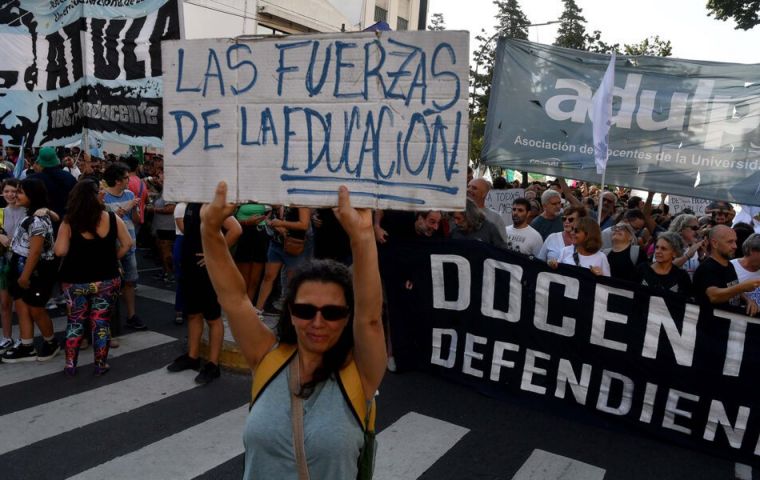MercoPress. South Atlantic News Agency
Argentine college students staging nationwide protest shakes Milei's political strength
 The measure was necessary because the government has consistently turned a deaf ear since January, Alpa said
The measure was necessary because the government has consistently turned a deaf ear since January, Alpa said The entire spectrum of Argentina's political opposition is, in one way or another, behind Tuesday's nationwide protest against President Javier Milei's spending cuts, particularly those affecting the funding of the country's tuition-free universities.
Not surprisingly, Milei will give a nationally televised speech later on Monday to highlight his government's achievements, which, if they exist, will be at stake in Tuesday's federal university march in Buenos Aires and almost every city in the country.
Milei's political strength, and with it the president's chances of staying in office, will be measured as a growing number of Argentines struggle daily to make ends meet. In this scenario, the Federal Undersecretary for University Policy, Alejandro Álvarez, has confirmed that universities will be audited to assess the size and scope of inappropriate spending under previous administrations, claiming that the people have the right to know what is being done with taxpayers' money.
The event brings together student groups, teachers' associations, other unions and politicians from the Radical Civic Union (UCR), Peronism, Kirchnerism, Sergio Massa's Frente Renovador (FR), the Civic Coalition (CC) -followers of former Congresswoman Elisa Carrió-, various leftist movements, and social organizations commonly referred to as “picketers”.
Milei's government sought to delegitimize the mobilization on the grounds that it lacked consensus and insisted that dialogue should prevail. Presidential spokesman Manuel Adorni said the protest, called by the National Inter-University Council (CIN), the Argentine University Federation (FUA) and the National Front of University Unions, was “encouraged” from the political arena.
The rector of the University of Buenos Aires (UBA), Ricardo Gelpi, and the vice-rector, Emiliano Yacobitti, both of the UCR, have reiterated that only Argentine flags will be acceptable.
Oscar Alpa of the National Inter-University Council (CIN) said that while “we are open to dialogue,” the measure was necessary because the government has consistently turned a deaf ear since January.
Earlier this month, the UBA declared a budgetary emergency, and other national universities followed suit.
The student protest also lifted the veil on the internal conflict between Buenos Aires city authorities (CABA) and the federal government over the security protocols to be implemented during the demonstration. In an autonomous city, federal law enforcement has jurisdiction inside federal government buildings, but Security Minister Patricia Bullrich is worried about overstepping that boundary. After all, the protest is against President Milei, not Buenos Aires Mayor Jorge Macri.
Students at the Universidad Argentina de la Empresa (UADE) have been trying since March 5 to create a student center, something that exists only at state-run universities. In the face of threats from UADE authorities that such an organization would be illegal, they have also pledged to join Tuesday's march.




Top Comments
Disclaimer & comment rules-

Read all commentsI see. So will it be the helicopter off the roof of the Casa Rosada next?
Apr 24th, 2024 - 06:33 am 0Commenting for this story is now closed.
If you have a Facebook account, become a fan and comment on our Facebook Page!